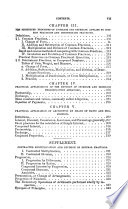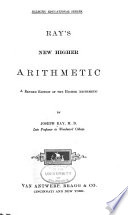 | Thomas H. Palmer - Arithmetic - 1854 - 368 pages
...Progression by Differences? II. The sum of all the terms in a Progression by Differences, IB equal to half the product of the number of terms by the sum of the first and hist terms. Exercises for the Slate or Slack-board. 1. What is the sum of a progression by differences,... | |
 | Joseph Ray - Arithmetic - 1880 - 420 pages
...that of the extremes, and hence, as the above illustrates, the double of any such series is equal to the product of the number of terms by the sum of the extremes. FORMULA. — s =. (« + t) n. ~~2~ "Rale.— Multiply the sum of the extremes by the number... | |
 | George Albert Wentworth - Arithmetic - 1896 - 490 pages
...Therefore, we have the following rule for finding the sum of an arithmetical progression : Take half the product of the number of terms by the sum of the first and last terms. Find the sum of nine terms of an arithmetical progression whose first term is 3 and last term 41. EXERCISE... | |
 | George Albert Wentworth - Arithmetic - 1897 - 480 pages
...Therefore, we have the following rule for finding the sum of an arithmetical progression : Take half the product of the number of terms by the sum of the first and last terms. Find the sum of nine terms of an arithmetical progression whose first term is 3 and last term 41. EXERCISE... | |
 | George Wentworth, David Eugene Smith - Arithmetic - 1909 - 290 pages
...the sum is J of 7 x 14, or 49. Therefore, to find the sum of an arithmetical progression, take half the product of the number of terms by the sum of the first and last terms. Thus the sum of nine terms of an arithmetical progression whose fust term is 3 and last term 41, is... | |
| |